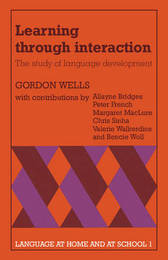
|
Learning through Interaction: Volume 1: The Study of Language Development
Paperback / softback
Main Details
| Title |
Learning through Interaction: Volume 1: The Study of Language Development
|
| Authors and Contributors |
By (author) Gordon Wells
|
|
Contributions by Allayne Bridges
|
|
Contributions by Peter French
|
|
Contributions by Margaret MacLure
|
|
Contributions by Chris Sinha
|
| Physical Properties |
| Format:Paperback / softback | | Pages:316 | | Dimensions(mm): Height 216,Width 140 |
|
| Category/Genre | Psycholinguistics |
|---|
| ISBN/Barcode |
9780521282192
|
| Classifications | Dewey:401.9 |
|---|
| Audience | | Professional & Vocational | |
|---|
| Illustrations |
Worked examples or Exercises
|
|
Publishing Details |
| Publisher |
Cambridge University Press
|
| Imprint |
Cambridge University Press
|
| Publication Date |
12 March 1981 |
| Publication Country |
United Kingdom
|
Description
There have been many studies of children learning to talk, but perhaps none as comprehensive - in terms of the number of children involved, the period of continuous observation and the scope of the analysis - as the Bristol Study of Language Development. This is the first full-length volume to be written by members of the research team and it is a fundamental study of language development from infancy to primary school. It synthesises the research to date and discusses some key socio- and psycholinguistic themes with reference to transcribed excerpts from spontaneous conversations recorded by the team and to experimental data. The authors' central argument is that conversation provides the natural context of language development and that the child learns through exploring his world of interaction with other people. The quality of learning is seen to depend particularly on the strategies that adults employ to develop and extend children's contributions to interaction. This has important practical implications for the transition from home to school, and the second part of the book examines the differences and similarities between the talk that goes on in these two environments. The final chapter considers the development of literacy. The model of language development presented here will make stimulating and challenging reading for a wide range of sociologists, psychologists and educationalists as well as being of particular interest to linguists.
Reviews'Gordon Wells and his colleagues have helped to enhance our respect for preschool age children, and have provided important ideas that will advance work on language development to a new level of understanding.' Educational Review
|